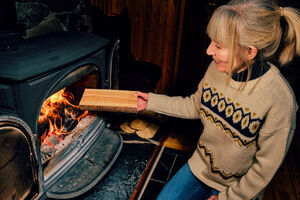5 Tips for Getting Your Home Winter Ready

The leaves have fallen and the temperatures are dropping — time to make sure your home is ready for winter! Here are a few easy items to check off your list.
Plumbing and Hoses
Make sure all of the hoses have been removed from the outside hose bib and drained. Adding a hose bib insulator to the faucet is also helpful for insulating. If your home is older or hasn’t been weatherized, when temperatures drop below zero leave cabinet doors open in kitchen and bathrooms so warm air in your home can reach the pipes. Make sure everyone in the family knows how to turn off the water at the main valve should a pipe break.
Smoke and Carbon Monoxide Detectors
Be sure to test or change batteries in smoke detectors and carbon monoxide detectors. Replace with new detectors as needed per the manufacturers recommendations. A good tip is to check smoke detectors and carbon monoxide detectors monthly.
Heating System
Don’t forget to replace the filters in your heating system. This is the time of year to have your heating system professionally serviced. If you have a gas, propane or fuel oil forced air furnace, it should be checked for a cracked heat-exchanger that can emit carbon monoxide. Heating companies sometimes offer specials on heating system inspections and cleanings in the fall. Having your heating system serviced now may help avoid the frantic call when it is 10 below zero and the heating contractor is three days out with all the other frantic no heat calls.
Fireplace or Woodstove
If you enjoy a warm fire during the colder months, call a chimney sweep for a cleaning and safety check. It’s frightening to see flames shooting from your chimney! Reverse your ceiling fans during the winter to keep the warm air circulating downward.
If you’re stocking up on firewood, make sure to store it away from your house or other buildings. The last thing you want to do is invite wood-boring pests like carpenter ants into your house. Storing your wood someplace with good drainage and on blocks can help maintain airflow under the pile to help reduce moisture problems which attract insects.
Emergency Kit
Update your emergency kit. We suggest having flashlights and extra batteries, a first-aid kit, and several days of water, food and medicines. Just imagine your whole family (including your pets!) being in your home for a week with no lights, no heat, no power. What would you need? Tip: fill empty bottles with water and keep them in your freezer. If the power goes out, the ice will keep your food cold longer and melt into water if you need it.
More Tips and Resources
You can also call us at (907) 330-8166 or toll free in Alaska at (800) 478-4636.
Want to renovate? We may be able to help.
If you’re thinking of making renovations to your home for weatherization, energy efficiency or another reason, we have several types of renovation loans. Click the links below to learn more!
![Alaska Housing Finance Corporation [Logo]](/application/themes/ahf2/images/logo.png?v=2)